Chalk it up: In an era of constant change, Bill Self has created a consistent contender at Kansas
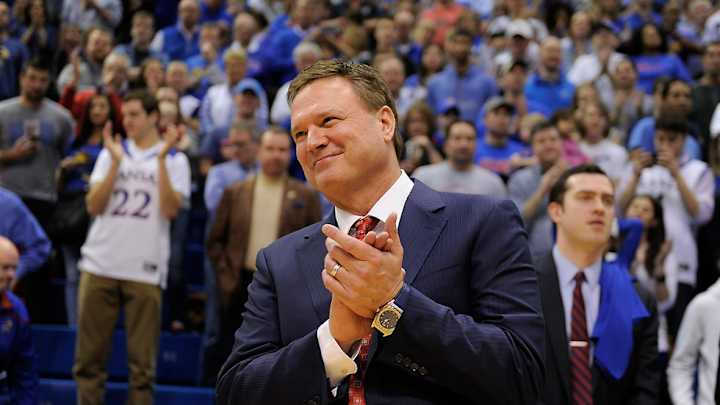
[video: 13724956]
LAWRENCE, Kan. — The sign for Salty Iguana, a Tex-Mex spot on the west side of town, is unsubtle. It is a lizard, wearing a sombrero and a serape, lounging in the giant margarita glass from which it drinks, using a straw. Some people drive past the strip malls along Sixth Street to arrive here by mid-afternoon, so they can reserve a table for Hawk Talk, the Kansas basketball radio show held just about every week during the season. They place their names on the sign-up sheet at the bar as early as 2 p.m. Hawk Talk begins four hours later.
But the head coach is coming. So the disciples wait.
When the show goes on, Bill Self sits at a high-top table to the right of iconic Kansas radio voice Bob Davis, facing a dozen rows of packed tables. He's situated in front of the Hawk Talk sign—which hails Salty Iguana as the "Preferred Mexican Food of Kansas Athletics"—and sips from an iced tea. At the beginning of every commercial break, patrons hustle to line up for an audience with the coach. Self autographs, among other things, a basketball, a shoe, a glass and a brick. He also inks a faux fan parking sign for Linda Martin, a Pleasanton, Kan., native who traveled an hour and a half to visit her sister and, as it happens, have the best day of her life.
"I can't wait to go to coffee in the morning and brag!" Linda says, bouncing in her Rock Chalk Jayhawk T-shirt.
The Hawk Talk crowd is dedicated and rapt. Each time returns to air after a break, a punitive Shhhhhh! cuts through the lingering chatter. The attendees boo the idea of red alternate jerseys. They laugh heartily when Self jokes that stoic, poker-faced stars Frank Mason and Perry Ellis should take a trip to Las Vegas. They cheer for Davis, who has announced his plans to retire after his 32nd season on the job. And they nod when Self tamps down the excitement over his team's 12th straight Big 12 regular season title. On the first day of March, he points out that postseason success is required to consider a year truly special.
"Come two weeks," the Kansas coach says, "this stage doesn't matter."
At 6:58 p.m., Davis signs off. Self does not hasten to an exit. Instead, he walks into the bar area to mingle, shaking more hands and signing more autographs. It's another 13 minutes before he's in the vestibule with his wife, Cindy, ready to leave but posing for one more picture with one more family. There isn't a moment in this surreal and claustrophobic hour that Self seems put out, or even bored. He knows all of it is just this side of ridiculous, and his program has been on a run that no conference has seen since John Wooden walked Westwood in the 1960s and 1970s, and the Final Four is just one month away. So his interest could be elsewhere. But he does Hawk Talk and smiles and scribbles his name and takes the photos. And, a little more than an hour later, he makes plans with Cindy to grab a salad around the corner at Mariscos.
Say this for Bill Self: The dude abides.
*****Kansas City Star/Getty Images
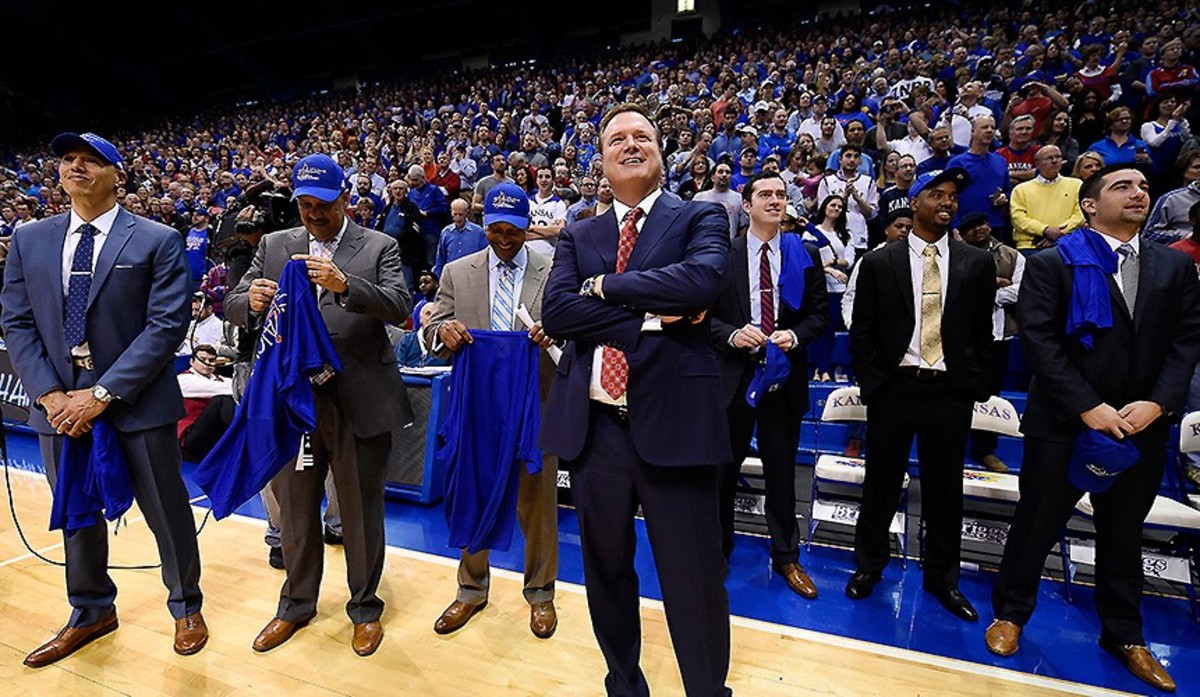
Kansas City Star/Getty
How does this happen?
How does one program win or share a championship for a dozen consecutive years in modern college basketball? This should not happen, not with one-and-dones and transfers and the general good health of most of the other teams gunning for the top of the league. So what is it about the guy running that singular program? How does he create a constant in an era of constant change? The search for answers leads to the office of Kansas's coach at 5 p.m. on a Tuesday in early March.
Detective John Munch is already there, and he wants answers, too.
On the big flat screen television across from the big coach's desk, Munch and his partner, Brian Cassidy, interrogate a perp. Three days after securing at least a share of Big 12 title No. 12, less than a day after clinching it outright by throttling Texas, four days away from the regular season finale and swelling expectations for March, Bill Self is watching Law & Order reruns.
"I'll take a break every day for this," he says. The 53-year-old coach of the Jayhawks, who enter the postseason at 27–4 and as the No. 1 team in the land, notes that this episode must be old, because it was before Dean Winters, the actor who plays Det. Cassidy, did insurance commercials. "Mayhem," Self says. It's maybe as close a view of it as he gets.
The short answer for how 12 straight titles happens is that Kansas has really good players and a coach who won 66% of the time before he arrived, and who now has won 585 games at four schools across 23 seasons. The slightly longer answer is that the coach doesn't change profoundly from year to year. He may not overheat at lackadaisical warm-ups or feel compelled to keep 20-hour days anymore, but generally, what you see one November is the same thing you see the next November. Likewise, the coach's schemes and standards carry from one year to the next even if his personnel doesn't, all the way to practice plans you can set a watch to. And he also is convinced that enough is never enough. That players and coaches and teams are almost always capable of more than they think they are.
In sum, it is hard to run down Kansas when Kansas is forever chasing a level most teams can't hope to reach. "You can't ever be perfect and it keeps us driving forward," junior forward Landen Lucas says. "The last couple years, we've kind of settled as a team toward the [NCAA] tournament, but we haven't done as well as that team could have done. If there's been a year where he's definitely kept us pushing forward, it's been this year. You can see that. "
Results can't be guaranteed. But, based on almost a quarter-century on the sideline, the evidence suggests Self's approach guarantees a good chance at top-shelf success.
He establishes the rules and the tone for the Jayhawks early, usually when five-on-five competition begins in the summer. Everything is live. There is no out of bounds. Nothing is over until the ball is scored or secured after a defensive stop. It fosters a sort of brute peer pressure; Kansas assistant Norm Roberts recalls then-freshmen Andrew Wiggins and Wayne Selden staring idly before the 2013–14 season as big men Jamari Traylor and Tarik Black tore at a loose ball. "What happens is, the other guys will look at you like, 'Go get the ball! What's wrong with you, man?'" Roberts says. A couple trips later, the two young wings pounced on an up-for-grabs ball themselves. "That was something that stuck out to me, and it was coming from older guys that were here four or five years that were diving on the ball out of bounds in a practice that was a month or two before the season," Lucas says. "I was like, 'This is no joke.'"
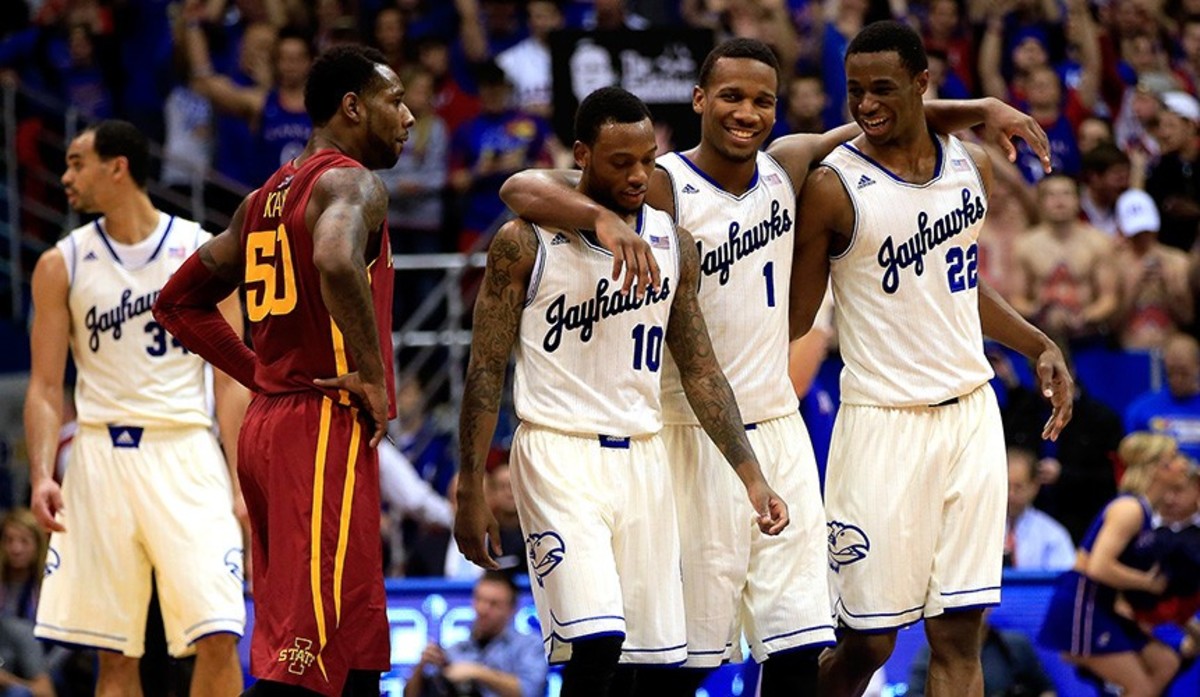
Jamie Squire/Getty
The structure is sound and unwavering. Kansas begins practices with the same brief dribbling, passing and shooter close-out periods. Like the defensive shell drill and others that follow, these are mainstays. "It wouldn't be a practice if we didn't do them," senior forward Hunter Mickelson says. The routine is designed to create muscle memory. It insures against slippage in something as simple as footwork when running down a shooter, or guards and big men working in tandem to defend a certain action. This in part explains why Kansas has ranked in the top 11 nationally in defensive efficiency in 10 of its past 12 seasons, despite roster and talent fluctuations.
And that is a reflection of Self's guiding philosophy, which all but takes the relative talent of his team out of the equation: He just wants to make the other guys play badly.
"No matter what level you play to," Self says, "you have to make sure someone plays at a lesser level."
Kansas has made that happen 82% of the time under Self's watch. It is steady success because Self maintains a steady suspicion that no one is doing his best. This not restricted to passing, cutting or shooting from the corner. You can eat better. You can get more rest. You can think more positively. "How many people in life ever get totally against their ceiling?" he says. "As great as you are, there's probably something you could do, at some point in time, to make you a little bit better, in some way shape or form. There's gotta be something." It is not an original way of thinking, and he is not totally pathological about it; after a season Self can reflect and conclude that his team maxed out. But in the midst of the chase, he wonders if there is something more to extract from everyone.
This is when his players hear the Ten Percent Speech.
"He always talks about, 'If we just give 10% more, we'll be a lot better,'" says Traylor, the fifth-year senior forward. "He always asks, 'Mari, how do you think you played? As far as your effort goes, you think you could do a little bit better?' I'm like, yeah, I think I could probably do a little bit better coach. 'You think you could [be] ... 10% better?' I'm like, 'Yeah, I probably could do 10% better.' He's like, 'If you do 10% better, Wayne [Selden] does 10% better, Frank [Mason], you do 10% better, and if I can coach you guys 10% better, too, we'll be a lot better."
It deftly transfers ownership of expectations back to the players. To wit, Roberts tells the story of a February practice gone sour: Self was livid in the huddle afterward, but he was also cognizant that a critical road game against Baylor loomed. So he swallowed the rage fireball. He declared that his team would be better the following day. Then he asked for confirmation. He inquired if Mason thought the Jayhawks would be better the next day, and, of course, the junior guard replied affirmatively. Self repeated the question a couple more times; the answer would not be different, but Kansas's coach needed to hear it out loud. By the time the confab had ended, Self's roster had signed itself up for a good day of work.
The Jayhawks won that next game in Waco, 66–60. "He makes the players play the way he wants," says Ellis, the senior forward who is Kansas's leading scorer (16.5 ppg). "That's a key."
A Bill Self-coached team hasn't finished lower than second place in its league since his first year at Tulsa, in 1997–98, when the Golden Hurricane finished third in the WAC's Pacific Division. The second-place finish at Illinois in 2002–03, the second-place finish in his first year at Kansas, in 2003–04—these are the bad seasons, he points out. It stands to reason that an unflinching record of success would give Self no reason to change the way he runs a practice, or to stray from a belief that everyone can do just a little bit better.
This is how you thrive at a place like Kansas. Everyone wants you to win a national title. You ask: Why stop there?
*****
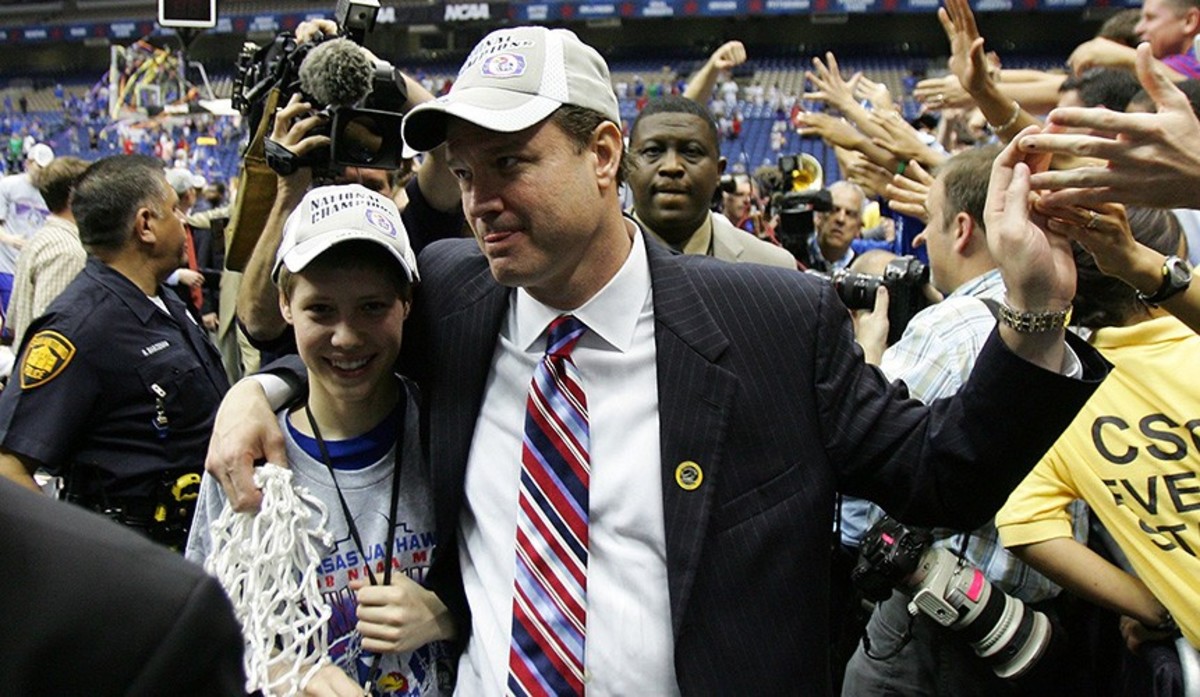
Getty Images file
The Self family vacation on Fisher Island, a ritzy destination separated from Miami's South Beach by a ferry ride across a narrow water channel, ended after two days in April 2003. Dad, who was then the head basketball coach at Illinois, had a job interview. So the entire family was forced to leave an idyllic spot where everyone traveled by moped or golf carts. It took a while for Tyler Self, then 9 years old, to get over that—"There was some bad blood there," he says—but soon enough he was begging to wear his new Kansas gear back in Illinois to celebrate his dad's new gig. (Cindy Self convinced her son to wait on that, prudently.)
It was a transformative moment, but only in the sense that a Florida trip got transformed into a virtual layover between Champaign, Ill., and Lawrence. The moment could have marked the start of a process that would warp an easygoing coach with a relatively rational perspective into someone substantially more cynical and guarded. But here is Bill Self, almost 13 years later, shaking hands with fans in the bar of a Mexican restaurant. "There are few programs out there like this with the pressure, the hype, all the attention you get," says Tyler Self, who now has a front-row seat to all that as a fourth-year walk-on for his father at Kansas. "It can definitely change people. But he's done a good job of keeping a level head, not letting all the great things people tell him get to him, or letting all the crap get to him."
Truthfully, some stuff got to him, at least at the start. "Taking the job, I felt like I've got to work 20 hours a day or I'll never be able to come close to what my predecessor did here," Self says, alluding to Roy Williams's 418 wins and four Final Four appearances as Kansas coach from 1988 to 2003. "I think I worked harder then, but I didn't think I worked very smart." With time, familiarity and confidence came a more efficient approach. When he began coaching, he choreographed pre-practice warm-up dribbles: First speed dribbles, then crossovers, then behind-the-back. Now he tells guys to get loose and expects that his players know to get to business when practice truly starts. He likewise says he's mellowed to players tuning him out in spots.
"I could not understand—if I tell you to do this, then why aren't you doing it?" Self says. "As opposed to, well, sometimes we don't listen, and sometimes we're defiant, and sometime we're stubborn, but it's not personal. That's just how we are sometimes."
These sorts of changes aren't superficial—how Self interacts with his team is pretty essential—but they aren't a comprehensive remodeling of his personality. He works at Kansas, a place where a coach can line an office shelf with basketballs signifying landmark program victories from No. 1 to No. 2,000. But the oppressive pressure to continue piling up those wins seemingly hasn't twisted him into someone unrecognizable to anyone who knew him as the easygoing coach at Oral Roberts or Tulsa or Illinois. Part of that is because he's wired to welcome that oppressive pressure. Part of it is because he can't take himself or the work too seriously.
"There are so many people out there that are busting their butt or trying to get a job and stuff, and hey, they pay me to coach," Self says. "Sometimes I think we make ourselves out to be bigger deals than what we really are. We're just ball coaches."
Some of his players might disagree. At the risk of delving into syrupy coach-as-teacher territory, Ellis remembers Self assigning him to be the voice of Kansas's Ice Bucket Challenge video in August 2014, nudging the junior-to-be out of his comfort zone. "From that point on," Ellis says, "I started to get a lot more confidence and speak what's on my mind." Traylor's favorite story, one he recounted four days before he shared it with an entire arena on Senior Day, traces back to his freshman year. Traylor's father was sentenced to life in prison for drug-related offenses when he was a teenager in Chicago, and his mother at one point kicked him out of the house when the acting out and arguments became too much. And now Self was laying into the Jayhawks after a practice, ranting about how none of them ever had it really rough, how none of them could complain when one of their own was once homeless. Traylor saw some genuine emotion in his coach's eyes. He wasn't naïve; he knew Self wanted him to help win games at Kansas. But that speech convinced Traylor his coach wanted something more for him, too. "He told me I should never have a bad day," Traylor says. "I wake up, I have a degree, I'm living in a beautiful home, I got fans behind me, I should never have a bad day. He changed my mindset a little bit on life."
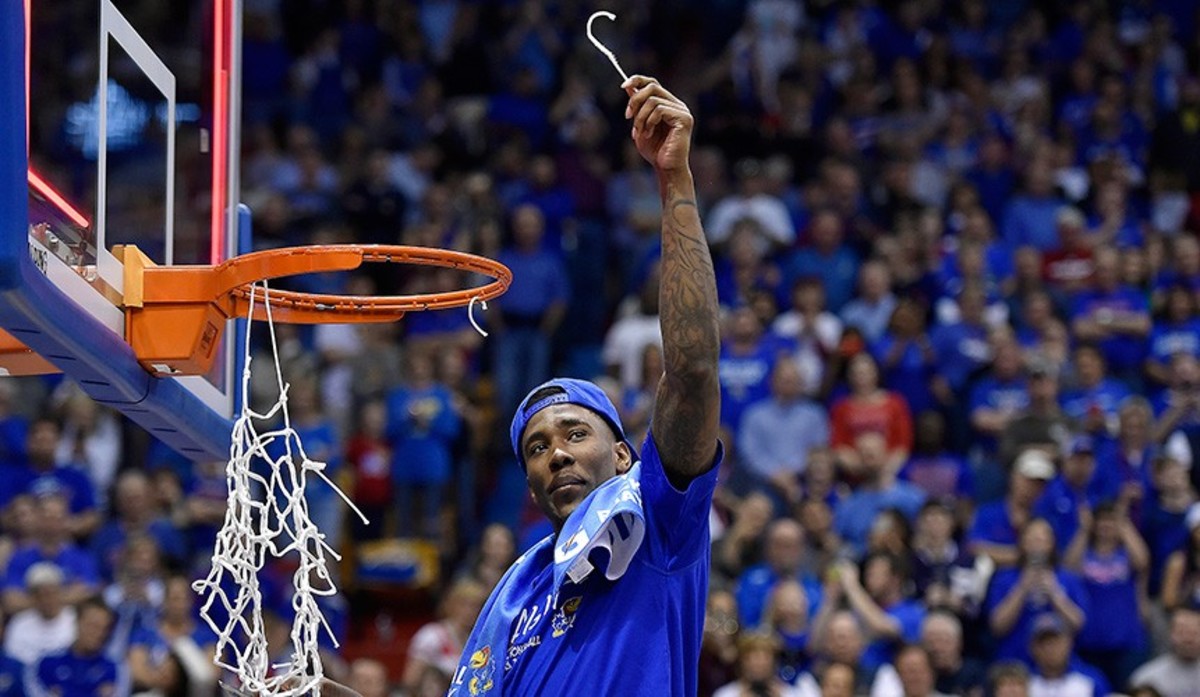
Kansas City Star/Getty
Traylor told that story on Senior Day and brought Self to tears. And yet, even now, Self declines to be impressed with himself. "I don't know that [we] did anything except be who we always are," he says.
It is not an ordinary job, of course, or else fans wouldn't show up four hours early to watch him talk. But Kansas's coach has a theory about why the gig permits him to remain unwound. "I would say, here, we have about the most realistic unrealistic supporters possible," Self says. What he means: Jayhawks fans are like most other fans, in that they think their place is the best place. But a history that includes names such as James Naismith and Phog Allen and Wilt Chamberlain also checks their expectations at least a little. They recognize what they're watching can't be the best it's ever been here.
The Jayhawks coaches issue the similar messages to every prospect they recruit: You're not going to be the greatest player ever to wear the jersey. And Self is keenly aware he won't be the program's most legendary coach. He is confident enough in his ability to produce the results the fans crave, yes. But since he may never be elevated to the ethereal basketball plane inhabited by those who came before him, he is somewhat freed in other respects. "If you do it the right way over time," Self says, "they're O.K. with that."
If only he could be, too.
"It's not that he just wants to win," Tyler Self says of his dad. "He really, really hates to lose."
Bill Self is a prisoner to his own ambition. Enough is never enough. He wishes he weren't that way, that he could enjoy the successes more than he does, or at least more than he despises the failures. The streak of 12 straight titles, which is one shy of UCLA's record run of 13 from 1967 to '79, the likely spot in the Hall of Fame ... these make him happy, but only to a point.
If you want to know what keeps him going, it is April 7, 2008—the night Kansas won a national title. "There's only been one game where the win has felt as good as the losses have felt bad," Self says. "There's only been one."
*****
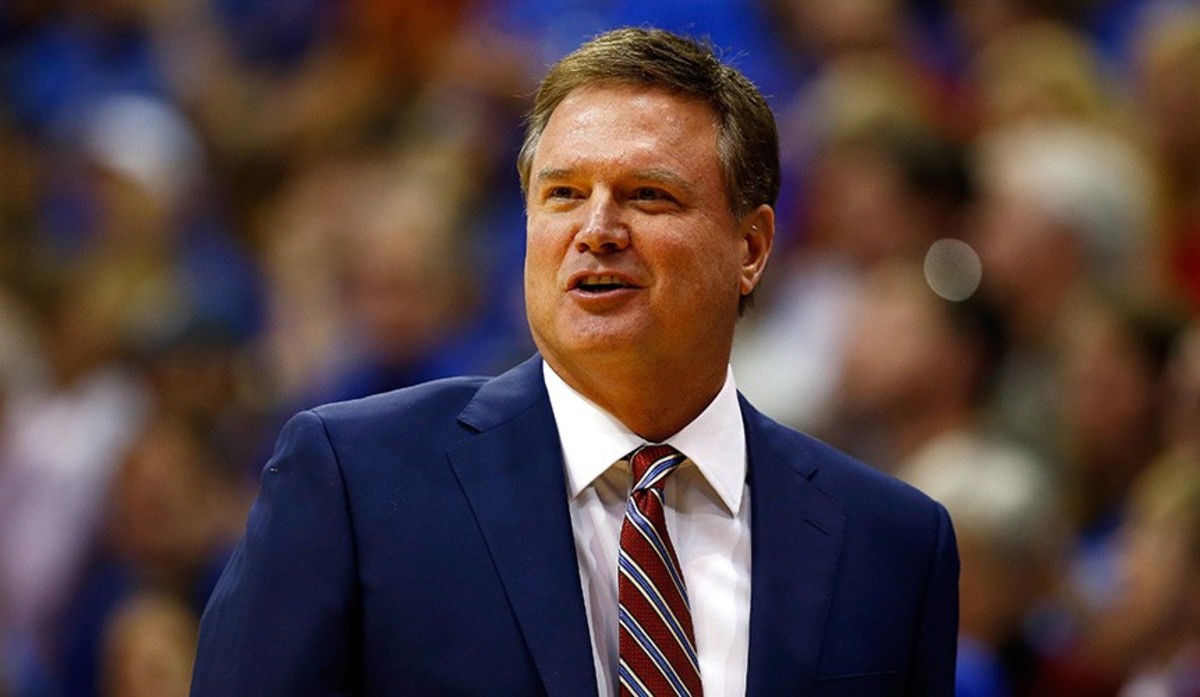
Jamie Squire/Getty
The clock at the top of Phog Allen Fieldhouse reads 4:04 p.m., and Kansas players are circled around their coach, discussing Senior Day ticket distribution. Names and phone numbers are required to prevent counterfeiting. That housekeeping taken care of, Self redirects the focus to the practice at hand. It won't be a long one, what with a championship in hand and three more days until Iowa State visits for the regular season finale. After telling the team to have a good day, and apropos of nothing, Self turns his attention to sophomore forward Svi Mykhailuk.
"Svi, nice haircut," the Kansas coach says, smiling. "About time."
Moments later, the workout begins like every workout begins. First, the three sets of warm-up dribbles. Then, the "Seminole" passing drill, with players firing balls to each other as they crisscross and exchange places in constant motion. After that, the roster breaks into five sets of three players for a close-out drill, which is basically a modified game of monkey-in-the-middle: Two players on either side, with the man in the center running after passes and squaring up the recipient in a defensive stance. The routine is the genius, the genius is the routine. When Kansas plays basketball, the same thing happens, again and again.
As much as Bill Self values that sameness, as much as he sees no reason to change, it was less than three years ago that, after the Okmulgree, Okla. native and ex-Oklahoma State guard was being inducted into his home state's Sports Hall of Fame, he told The Oklahoman that the NBA could tempt him one day. But that was then. Then, Kansas hadn't built McCarthy Hall, an $11.2 million apartment complex that houses his basketball players as well as other non-student-athletes. It features a rec room and a barbershop. Self believes it has few peers anywhere. He now has a stockpile of Big 12 rings as well a fancy dorm to show recruits and, well, this is something that should delight a coach who always seeks more.
So he's asked the question now, on the day the calendar turns to March again. Can Kansas give you all the challenges you need? Is this place enough?
Bill Self's answer, which comes without hesitation, makes you wonder if anything will ever change at all.
"I think so," he says. "Because as good as it's been, I think it's getting ready to get better.
